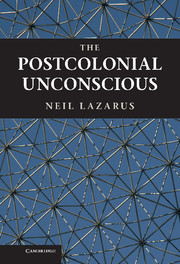Book contents
- Frontmatter
- Contents
- Acknowledgements
- Introduction: The political unconscious of postcolonial studies
- 1 The politics of postcolonial modernism
- 2 Fredric Jameson on ‘Third-World Literature’: a defence
- 3 ‘A figure glimpsed in a rear-view mirror’: the question of representation in ‘postcolonial’ fiction
- 4 Frantz Fanon after the ‘postcolonial prerogative’
- 5 The battle over Edward Said
- Notes
- Works cited
- Index
Introduction: The political unconscious of postcolonial studies
Published online by Cambridge University Press: 05 June 2012
- Frontmatter
- Contents
- Acknowledgements
- Introduction: The political unconscious of postcolonial studies
- 1 The politics of postcolonial modernism
- 2 Fredric Jameson on ‘Third-World Literature’: a defence
- 3 ‘A figure glimpsed in a rear-view mirror’: the question of representation in ‘postcolonial’ fiction
- 4 Frantz Fanon after the ‘postcolonial prerogative’
- 5 The battle over Edward Said
- Notes
- Works cited
- Index
Summary
Much of my own work since the early 1990s has taken the form of a contestation of particular ideas and assumptions predominant in postcolonial studies. I have sought, in general, to call into question concepts and theories that have seemed to me to lack accountability to the realities of the contemporary world-system that constitutes their putative object; and also to register my disagreement with the partial and tendentious ways in which the work of some key writers in the field has been taken up. In The Postcolonial Unconscious, however, I want to move from the ‘negative’ moment of critique to the more ‘positive’ moment of reconstruction. While I still believe that it is important to write in the mode of critique, I will be concerned here also to propose alternative readings and conceptualisations, to be set alongside and compared with those currently prevailing. Much of this book will therefore be devoted to an elaboration of concepts, methods, and substantive themes, upon which what I would view as a plausible ‘reconstruction’ of postcolonial studies might conceivably be based.
The work of reconstruction needs to begin, I think, with a periodisation of postcolonial studies, aimed both at situating its emergence and consolidation as a field of academic enquiry and at contextualising its distinctive emphases and investments. Concerning the latter, we can register immediately the supplementarity of postcolonial studies to post-structuralist theory.
- Type
- Chapter
- Information
- The Postcolonial Unconscious , pp. 1 - 20Publisher: Cambridge University PressPrint publication year: 2011



